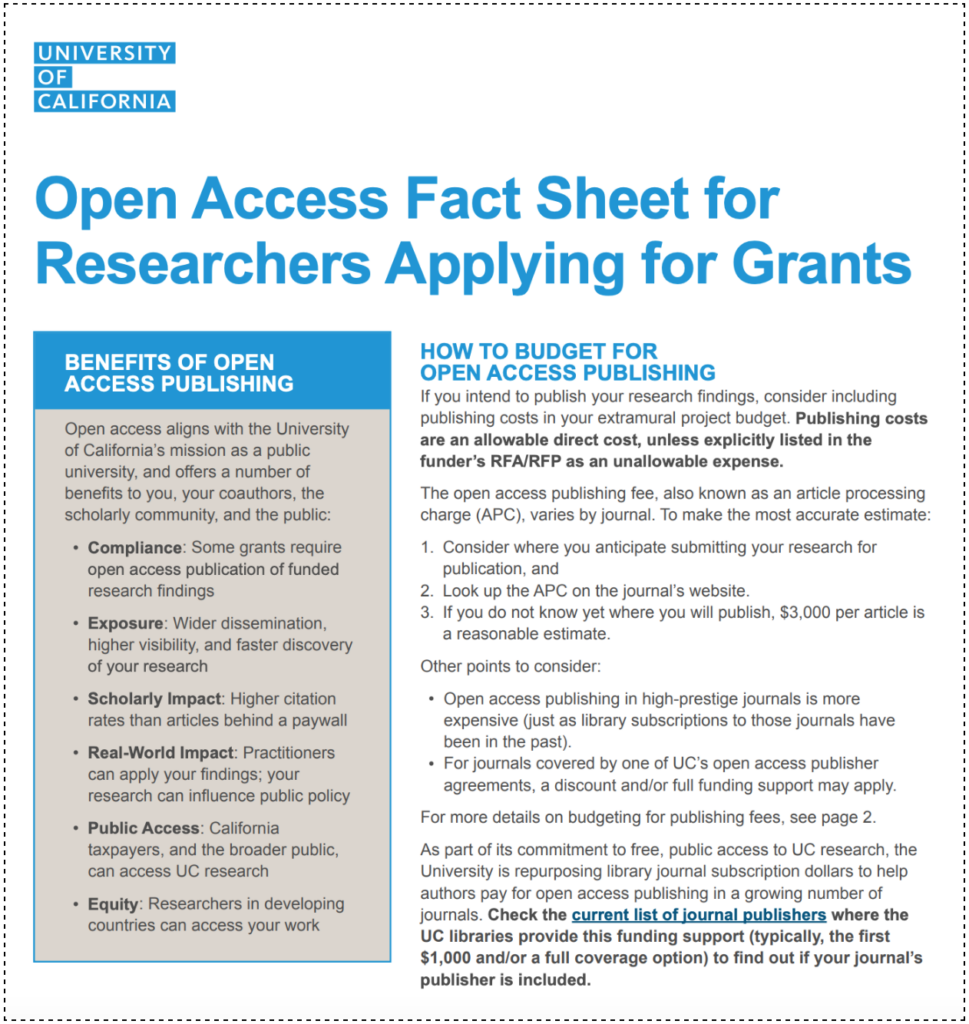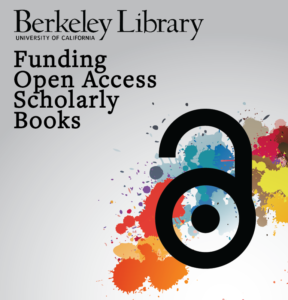Tag: article processing charges
UC Berkeley author tips: What to do when you have to pay an open access publishing fee
This post provides information to UC Berkeley authors about programs that our Library and the UC system offer to help defray open access article processing charges. It also offers tips about how to plan or budget in advance for these fees when possible.
The University of California has been a long-time supporter of open access publishing—that is, making peer-reviewed scholarship available online without any financial, legal, or technical barriers. Just because the publishing outcome is open to be read at no cost, though, doesn’t mean the publishing enterprise as a whole is “free.” One of the most common ways for open access publishers to continue to finance their publishing and production of journals in the absence of selling subscriptions for access is to instead charge authors a fee to publish—moving from a publishing system based on paying to read to one based on paying to publish. Of course, not all methods of funding open access require authors to pay publication fees in this way. And in all cases (except those rare instances in which a publisher requests that you waive this right), the UC’s open access policy makes it possible for UC authors to share their author-accepted manuscript version of their articles on eScholarship, the UC’s research repository, immediately upon publication in a journal.
But when a publisher does charge a fee to publish, we want to help you understand what UC Berkeley resources are available—whether from your grant funds or the University of California Libraries—to help with those costs.
Typically publishers refer to author-facing fees as “article processing charges”, or “APCs”. APCs can range from a few hundred dollars all the way up to $10,000 or more for some select Nature journals.
UC authors may be able to cover or contribute to these fees by leveraging research accounts or grant funds (to the extent available). But there are also other University Library programs available to support payment when research accounts or grant funds are not available.
UC-wide open access publishing agreements will cover some (or all) APCs
UC corresponding authors can take advantage of funding opportunities to defray the cost of publishing their scholarship open access where their grant or other research funds come up short or are not available. The University of California libraries have entered into a growing number of systemwide transformative open access agreements with publishers. UC libraries’ transformative agreements aim to transform scholarly publishing by moving from a publication model based on subscription access to an open access model.
When a UC-affiliated corresponding author has an article accepted for publication in a journal with which the UC has an open access publishing agreement, the UC libraries will pay some or all of the associated publishing fee. So, when it comes time to pay the APC, the UC libraries will pay at least the first $1,000. If there’s any remaining balance due on the APC, the publisher’s payment system will ask if the UC author has grant funding available to cover the remainder. If the UC author cannot contribute the remaining balance, the UC libraries will pay the entire APC on their behalf. (Note: there are a few instances where the UC libraries will contribute a maximum of $1,000 toward the APC, such as Nature-branded titles.)
The UC maintains an updated list of Publisher OA Agreements and Discounts where you can explore which journals are available for partial or full APC coverage under the open access agreements.
The UC Berkeley Library-specific fund can reimburse open access fees for other fully open access journals
UC Berkeley’s Library also has a campus open access fund that UCB authors can use if they are publishing in a fully open access journal and are required to pay an APC. The Berkeley Research Impact Initiative (BRII) is open to any current UC Berkeley faculty, graduate student, postdoc, or academic staff who does not have other sources of funds to pay article processing charges. The BRII fund is available for journals other than those with which the UC has entered into a systemwide transformative open access agreement.
For BRII APC coverage to apply, the entire journal must be freely available to the public without subscription fees. BRII cannot cover fees for publishing in “hybrid” OA journals—which are subscription-based journals that only offer open access options if an author decides to pay an additional fee to make their individual article open access. BRII reimbursements are capped at $2,500 per article, and a UC Berkeley author can use BRII funds once per fiscal year.
How to plan in advance
If your research is grant funded, it is important to think about publishing costs at the beginning of your research cycle and account for them in your grant applications and annual research budgeting. For grant recipients (such as researchers with funding from NIH, NSF, etc.), open access publishing costs generally are considered an allowable direct expense unless funders explicitly prohibit them. For more information on how and why to plan in advance, check out the Open Access Fact Sheet for Researchers Applying for Grants.

Planning in advance allows you to be a partner in the publishing process. It allows the UC libraries to cover some of your article processing charge ($1,000) and, where possible, you to use grant or research funds to cover the rest. The more researchers are able to contribute, the farther the UC agreements can go in publishing more articles open access, and the better UC libraries are able to help provide financial support to researchers who do not have specific access to grant funds.
Most of the UC transformative open access agreements are set up to cover the full article processing charge should UC authors not have research or grant funds to contribute to making their journal articles open access. But there are a few journal titles and series within transformative agreements for which the libraries were unable to negotiate full coverage. For example, if a UC author has an article accepted in Nature Communications, the UC libraries cover only the first $1,000 of the article processing charge through the terms of the UC-Springer Nature transformative open access agreement. Since the current APC for Nature Communications is $6,290, then the UC author must pay the remainder of the fee ($5,290).
Another instance in which an author may need to pay a balance is when the author is publishing in a fully-open access journal not covered by a transformative agreement at all, and in turn when that journal’s article processing charge exceeds what can be covered through the BRII program. For instance, if a UC Berkeley author has an article accepted for publication in JAMA Network Open, the BRII program is capped at covering $2,500 of the article processing charge. Since the APC for JAMA Network Open is $3,000, then the UC Berkeley author must pay the remainder of the fee ($500).
Since both of the examples above are journals in which an APC is required in order to publish there, authors are responsible for securing the remainder of any publishing fees should the open access publication costs exceed the amount of UC libraries (or UC Berkeley Library’s) support.
Need more help?
- Contact the Library’s Office of Scholarly Communication Services at schol-comm@berkeley.edu
- Read the Open Access Fact Sheet for Researchers Applying for Grants
- Explore the Open Access at UC webpage
- Explore the Open Access at Berkeley webpage
- Watch the YouTube workshop video How to Publish Open Access at UC Berkeley
- Visit the Berkeley Research Impact Initiative (BRII) website
Library will fund publishing of open access scholarly books
 The Library is expanding the Berkeley Research Impact Initiative (BRII) program so that Berkeley authors can publish scholarly books open access at zero or substantially reduced costs—making these books free and accessible to readers around the globe.
The Library is expanding the Berkeley Research Impact Initiative (BRII) program so that Berkeley authors can publish scholarly books open access at zero or substantially reduced costs—making these books free and accessible to readers around the globe.
The BRII program fosters broad public access to the work of Berkeley scholars by encouraging the Berkeley community to take advantage of open access (OA) publishing opportunities. OA literature is free, digital, and available to anyone online. With barrier-free access, researchers and decision-makers from anywhere in the world can read the scholarly output of UC Berkeley authors.
“OA publishing is helping us advance the relevance and reach of our science so that it can get in front of the people who need to be seeing it, and who are in a position to act upon the results of our research in ways that we as scientists alone can’t,” says Rachel Morello-Frosch, UC Berkeley Professor of Environmental Science, Policy and Management. “BRII helped me make access to my research affordable and it wiped away a lot of barriers.”
Morello-Frosch has published several articles OA using BRII funds. The funds are applied toward article processing charges (APCs), which many journal publishers impose on authors and which can range from $750-$3500 or more. These fees serve to replace revenue the publisher would have generated via library subscriptions if access to the journal had been licensed by the library for campus readers. BRII began in 2008 by redirecting a small amount of Library collections funds to help authors cover these APCs for open access journals so that Berkeley authors could participate in the wider dissemination that OA publishing offers.
While many scholars in the humanities and social sciences publish in OA journals, they also publish scholarly books, termed “monographs”. These books become a critical component of professional credentialing, yet their readership is limited by the same kinds of access barriers endemic to subscription-based journals: The scholarly books are quite expensive, and increasingly fewer libraries can afford to purchase them. By expanding BRII to also cover the publishing fees for OA books, BRII can help Berkeley authors publish long-form scholarship that can be read by anyone at no cost.
These digital editions of peer-reviewed and professionally edited OA books typically offer readers more than just the text itself. Digital monographs can also incorporate multimedia with the text, include annotation and commenting tools, and provide platforms that further encourage the development of innovative scholarship.
University presses’ funding models for financing OA books are innovative and evolving. UC Press’ Luminos program, for instance, is formulated as a partnership in which costs and benefits are shared by member organizations. Many academic publishers also offer a print or print-on-demand version of the book for sale to readers who prefer hard copies, further enabling cost recovery through traditional print sales. Some publishers have found that making the book available OA not only drives up digital readership but also print sales, too.
At their core, most OA book funding models typically charge academic authors the equivalent of an APC. Yet, given the greater investment needed to create and edit longer and more complex manuscripts, the book processing charges (BPCs) can range upwards of $7000. This sum can be out-of-reach for humanities and social sciences authors if available funding sources do not adequately cover research and publication needs.
To address this situation, in this first pilot year of funding BPCs, BRII will offer $7500 a piece in publishing fees for up to three OA scholarly books.
“The expanded BRII program will support increased OA publishing by Berkeley humanists and social scientists, and augment the reach of their work,” explains University Librarian Jeffrey MacKie-Mason. “We aim to democratize scholarly publishing by lowering access barriers and increasing Berkeley impact, and subvention funding for OA books allows us to do just that.”
To learn more about the expanded BRII program, please see the updated BRII guide. With questions about obtaining BRII funding, contact openaccess@lists.berkeley.edu.